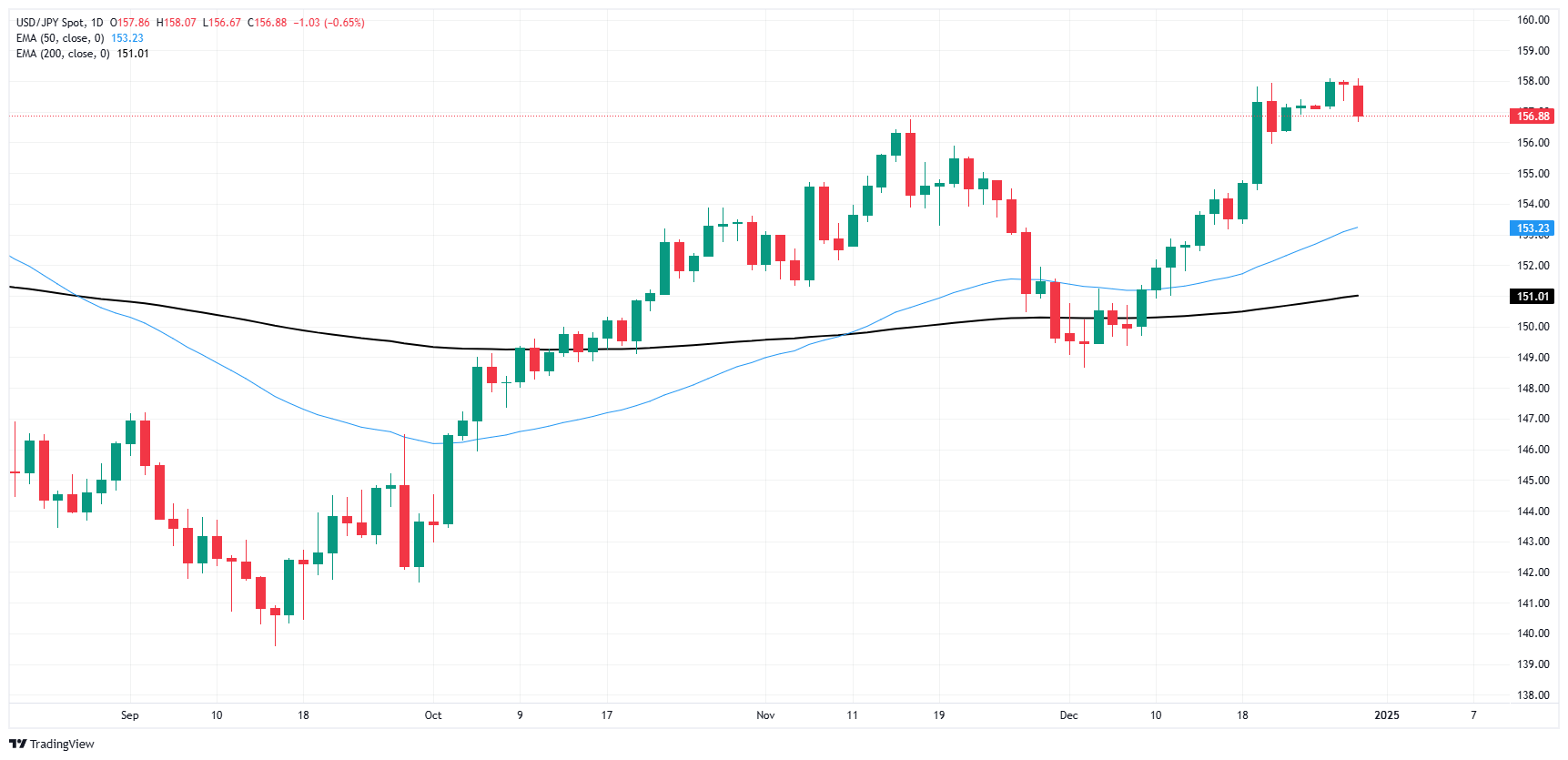- Phân tích
- Tin tức và các công cụ
- Tin tức thị trường
- USD/JPY pulls back, knocks back below 157.00
USD/JPY pulls back, knocks back below 157.00
- USD/JPY shed 0.7% on holiday-thinned market volumes on Monday.
- It’s a thin data docket on both sides of the Pacific, but US PMI figures loom ahead.
- Investors remain unsure of what signs the BoJ is waiting for to pull the rate hike trigger.
USD/JPY corkscrewed on Monday, backsliding seven-tenths of one percent and getting knocked back below the 157.00 handle as markets push back into the midrange ahead of the midweek New Year’s holiday closures. The year-end holiday session is in full swing, and broad-market volumes remain low.
The Bank of Japan (BoJ) has been fighting a hopeless battle trying to reverse a two-year decline in the Japanese Yen, pulling out all of the stops and attempting every policy tool at its disposal except raising interest rates. The BoJ reversed its negative-rate policy in March of 2024, followed by a tentative half-step in allowing interest rates to rise, reaching a blustery 0.25% before again freezing on policy rates. Nobody is particularly sure of what data will convince the BoJ to raise rates again, but the Japanese central bank has vowed to remain in a data-dependant approach on interest rates.
Both Japanese and US trade volumes are crimped as markets head into the New Year’s midweek holiday before the calendar rolls over into 2025. The US will kick things off next year with a fresh round of ISM Manufacturing Purchasing Managers Index (PMI) figures on Friday, with little else of note until then.
USD/JPY price forecast
Despite Monday’s bearish candle, USD/JPY is still holding deep into bull country, testing the waters near 157.00 after a brief push into the 158.00 handle. The pair rebounded off of the 200-day Exponential Moving Average (EMA) near 150.00, rising 6.35% bottom-to-top in the process.
The trick for buyers will be keeping the Greenback bid north of the 50-day EMA rising through 153.00. A break below this level could see price action return to the 200-day EMA currently grinding higher above 151.00.
USD/JPY daily chart
Japanese Yen FAQs
The Japanese Yen (JPY) is one of the world’s most traded currencies. Its value is broadly determined by the performance of the Japanese economy, but more specifically by the Bank of Japan’s policy, the differential between Japanese and US bond yields, or risk sentiment among traders, among other factors.
One of the Bank of Japan’s mandates is currency control, so its moves are key for the Yen. The BoJ has directly intervened in currency markets sometimes, generally to lower the value of the Yen, although it refrains from doing it often due to political concerns of its main trading partners. The BoJ ultra-loose monetary policy between 2013 and 2024 caused the Yen to depreciate against its main currency peers due to an increasing policy divergence between the Bank of Japan and other main central banks. More recently, the gradually unwinding of this ultra-loose policy has given some support to the Yen.
Over the last decade, the BoJ’s stance of sticking to ultra-loose monetary policy has led to a widening policy divergence with other central banks, particularly with the US Federal Reserve. This supported a widening of the differential between the 10-year US and Japanese bonds, which favored the US Dollar against the Japanese Yen. The BoJ decision in 2024 to gradually abandon the ultra-loose policy, coupled with interest-rate cuts in other major central banks, is narrowing this differential.
The Japanese Yen is often seen as a safe-haven investment. This means that in times of market stress, investors are more likely to put their money in the Japanese currency due to its supposed reliability and stability. Turbulent times are likely to strengthen the Yen’s value against other currencies seen as more risky to invest in.
© 2000-2026. Bản quyền Teletrade.
Trang web này được quản lý bởi Teletrade D.J. LLC 2351 LLC 2022 (Euro House, Richmond Hill Road, Kingstown, VC0100, St. Vincent and the Grenadines).
Thông tin trên trang web không phải là cơ sở để đưa ra quyết định đầu tư và chỉ được cung cấp cho mục đích làm quen.
Giao dịch trên thị trường tài chính (đặc biệt là giao dịch sử dụng các công cụ biên) mở ra những cơ hội lớn và tạo điều kiện cho các nhà đầu tư sẵn sàng mạo hiểm để thu lợi nhuận, tuy nhiên nó mang trong mình nguy cơ rủi ro khá cao. Chính vì vậy trước khi tiến hành giao dịch cần phải xem xét mọi mặt vấn đề chấp nhận tiến hành giao dịch cụ thể xét theo quan điểm của nguồn lực tài chính sẵn có và mức độ am hiểu thị trường tài chính.
Sử dụng thông tin: sử dụng toàn bộ hay riêng biệt các dữ liệu trên trang web của công ty TeleTrade như một nguồn cung cấp thông tin nhất định. Việc sử dụng tư liệu từ trang web cần kèm theo liên kết đến trang teletrade.vn. Việc tự động thu thập số liệu cũng như thông tin từ trang web TeleTrade đều không được phép.
Xin vui lòng liên hệ với pr@teletrade.global nếu có câu hỏi.















